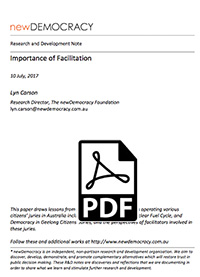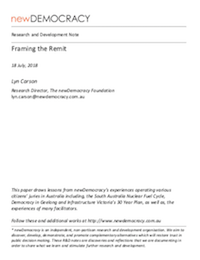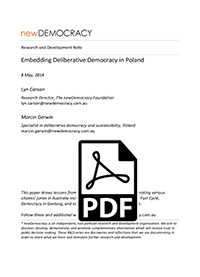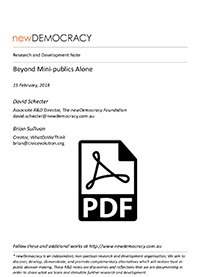Lyn Carson – Research Director, The newDemocracy Foundation
What is the question?
How are the usual challenges associated with working with groups addressed in mini-publics?
What are the usual answers?
In the political landscape, groups are commonly chaired (in committees) or arbitrated by a Speaker (in parliaments). When citizens are brought together in a public space, for example, for a town hall meeting, a professional facilitator or government staffer is employed.
It is commonly assumed that any professional facilitator can facilitate a deliberative forum. If they are experienced with facilitating a focus group or a public meeting, so this assumption goes, then they can surely facilitate a mini-public.
What are the problems with the usual answers?
A mini-public is not a town hall meeting which is designed to ‘give people a hearing’ whereas a mini-public aims to: share opportunities for voicing ideas and experiences; ask people to broaden themselves to other viewpoints; then work to find common ground.
Unfortunately, those foolhardy enough to assume that a mini-public is like a focus group, can come unstuck badly. We note that agencies often discover the crucial importance of facilitation only after their first deliberative process; and in some scenarios we receive requests for advice at the midpoint of extended processes. newDemocracy has witnessed a process go awry, and had to replace a facilitator with someone who more properly understood public deliberation. Therefore, when appointing and assessing the merits of a facilitator, an agency would do well to consider whether facilitators view themselves as the servant of the room or the star of the show, since problems can stem from the latter.
A brief focused discussion is not the same as a deliberation which is held over many days. Dominant and timid personalities surface, rigid thinking is exposed, and the range of competencies becomes evident. There are also issues with language or cultural differences that can be hidden in a public meeting or a focus group.
Deliberation (See, Deliberation) requires a different type of facilitation, and the role of the facilitator can make or break a deliberative forum. This is not a free-for-all town meeting or even a committee where people take turns to air their opinions. Facilitators who are used to these activities can fail in a deliberative environment where the emphasis is on learning a great deal, exploring common ground, and deciding together.
There have been instances where participants in a mini-public have insisted that a facilitator be replaced (an unfortunate UK experience), or where a participant has declared the facilitator biased because the decision making was not going his way, only to have the others in the mini public demand that the facilitator be allowed to continue to enable the group to find its way (after the participant took over and tried to lead the group in another direction).
What alternative answer (or better yet, answers) might solve the problems?
Mini-publics are often contested spaces. Real skill is required to be able to communicate clearly in everyday language, to enable respectful dialogue, and to build participants’ confidence in their capacity to deliver results; all whilst making progress toward the shared end goal. It requires careful process design, and a capable facilitator, or facilitation team (Holman et al, 2007).
It is also essential to develop a group’s critical-thinking capacities, (See, Critical Thinking) because options must be weighed and difficult choices made that require an awareness of biases and the interrogation of evidence. None of us are born with these capacities, and a facilitator needs to support their acquisition. A mini-public’s diverse membership is meant to resemble the entire population and this brings advantages, as well as inevitable challenges. Exposure to personal biases and critical-thinking approaches helps to address those challenges and also equips participants with the ability to moderate their own small-group discussions.
What are the pros and cons of the alternative answers, compared to the usual answers and to each other?
In what way is facilitation of a mini-public different from facilitation of a public workshop?
There are many differences, starting with the group itself. Typically, mini-publics are randomly selected, and rarely arrive with a pre-determined outcome in mind – instead almost always curious and excited. They are there because they wish to be there, and participants’ willingness is a blessing for facilitators. Participants are welcomed into the space and soon realise the hard work ahead because they are making a decision that will affect an entire community or population. During a meet-and-greet session, it is essential that expectations are made transparent. Participants take this role very seriously, but may be unfamiliar with group work, and they must get down to work quickly. The facilitator must provide important guidance about how to do this. Once group cohesion is established and guidelines agreed upon, that hard work should progress smoothly.
Participants in mini-publics are often surprised by their ability to work productively within a diverse group, without having to ignore differences, when they have a facilitator who encourages the surfacing of differences of opinion (for instances of this see, for example, Gastil 1993). It is not always easy or comfortable, but there is increased understanding of other perspectives and a willingness to accommodate them.
Given that most mini-publics run for at least a couple of days, it’s important for facilitators to provide a range of ways for jurors to interact; to change the rhythm, the size of small groups, getting people moving, allowing time for quiet, individual reflection; to take into account the different learning styles of individuals; and to help keep the group fresh and able to do their best critical thinking.
Always top-of-mind for the facilitator is that their role is to enable the group to find its own way, not to lead, not to cajole, just to support the group with its own determinations (Hardy et al, 2013). This requires great skill – to honour the group’s own process decisions and be flexible enough to offer whatever micro-process will prove helpful to the group. Sometimes it is important for a facilitator to share his or her knowledge, for example, that voting will not necessarily be helpful – because it’s difficult to shift one’s viewpoint once voting has occurred. If the information gathering, or expert questioning, or decision-making, is not working well, then the facilitator, or sometimes participants, will need to try something new that does (Hunter et al, 1995). The result should be reminiscent of Lao Tzu’s oft-quoted claim[1], paraphrased here as ‘leadership is best when the people say: we did it ourselves’.
This means that timeframes cannot be accurately estimated in advance. There have been occasions where groups have worked until the early hours of the morning (noted by the author, during the first Australian Consensus Conference in 1999 with deeply committed participants). There have been many occasions where groups have insisted on an additional session to refine their report or clarify its collective recommendations. The facilitator and the organisers must be prepared for this eventuality and be able to build in additional time, when required.
Deliberation does not occur in only one room. Sometimes field trips are necessary (Twyfords Consulting, 2012). Participants learn an enormous amount and the facilitator must keep up with this. It is not important that a facilitator knows anything about the topic under consideration, indeed it is preferable that he/she does not. It is easy to subconsciously lead a group toward a pre-determined answer. Shared ignorance can make the facilitator and participants erstwhile companions on the journey of discovery.
Co-facilitation works very well because two or more facilitators can attend to both task (getting the job done, staying focused on the group’s purpose) and maintenance (ensuring each group members is being heard, that the group is working harmoniously). Larger groups often do much of their work in very small groups depending upon the activities to be completed—for example, in the South Australia Nuclear Fuel Cycle Jury with over three hundred participants and nearly twenty facilitators along with two lead facilitators. This required tremendous clarity of purpose and consistency, particularly with very clear and shared objectives for each session. There are then challenges when reconvening, to maintain shared goals and outcomes. Multiple sets of ears and eyes, and different process designers, are better than one – especially since modifications often have to be made on the run.
Facilitators know that the group must reach an agreement. This requires tremendous skill, to hear what group members are saying and respond adequately while also ‘pushing through’ to a decision. The facilitator must attend to the micro-processes at hand to allow this to happen. There are not many processes in traditional forms of community engagement that go to this level.
Finally, a facilitator who delights in the experience as much as the participants is a rarity, but is essential for the group’s success. The facilitator must have a genuine curiosity, willingness, and ability to help the group surface differences and disagreements while exploring them respectfully in order to reach an outcome that works for all.
What important questions remain unresolved?
Currently there are not enough facilitators with the skills and experience to successfully facilitate public deliberations, and the demand is likely to increase dramatically. What can be done to expand the pool of facilitators with these skills?
newDemocracy is extremely interested in the advantages of co-facilitation. We are currently exploring an apprenticeship model – encouraging an additional facilitator to come along to a mini-public, to provide essential experience with facilitating public deliberation. It is most important to deepen the pool of experienced facilitators. We remain interested in establishing whether or not these skills are innate or able to be learned. We remain optimistic.
newDemocracy is also providing a mentoring role to governments so that in-house staff can be exposed to the skills of facilitation for deliberating groups.
References
Gastil. J (1993) Democracy in Small Groups, New Society Publishers
Hardy, M, Fisher, K & Hartz-Karp, J (2013) ‘The Unsung Heroes of a Deliberative Process: Reflections on the Role of Facilitators at the Citizens’ Parliament’, in Carson, L et al, The Australian Citizens’ Parliament & The Future of Deliberative Democracy, The Pennsylvania State University Press, opp. 177-189.
Holman, P, Devane, T, Cady, S & Associates (2007) 2nd ed., The Change Handbook: The definitive resource on today’s best methods for engaging whole systems, Berrett-Koehler Publishers
Hunter, D, Bailey, A & Taylor, B (1995) Art of Facilitation: How to Create Group Synergy, Fisher Books
Thompson, N (2016) ‘1.11 Facilitating mini-publics, more from Australia’, Real Democracy Now! A Podcast, published Dec 13, (http://directory.libsyn.com/episode/index/id/4908426/tdest_id/432040)
Twyfords Consulting (2012) The Power of ‘Co’. The Smart Leaders’ Guide to Collaborative Governance, Twyford Publications
[1] Usually “A leader is best when people barely know he exists, when his work is done, his aim fulfilled, they will say: we did it ourselves.” See, for example: http://www.leadershipconsulting.com/the-lao-tzu-approach-to-leadership.htm or “
https://www.extension.harvard.edu/professional-development/blog/paradox-leadership
This paper draws lessons from newDemocracy’s experiences operating various citizens’ juries in Australia including, the South Australia Nuclear Fuel Cycle, and Democracy in Geelong Citizens’ Juries, and the perspectives of facilitators involved in these juries.
* newDemocracy is an independent, non-partisan research and development organisation. We aim to discover, develop, demonstrate, and promote complementary alternatives which will restore trust in public decision making. These R&D notes are discoveries and reflections that we are documenting in order to share what we learn and stimulate further research and development.




